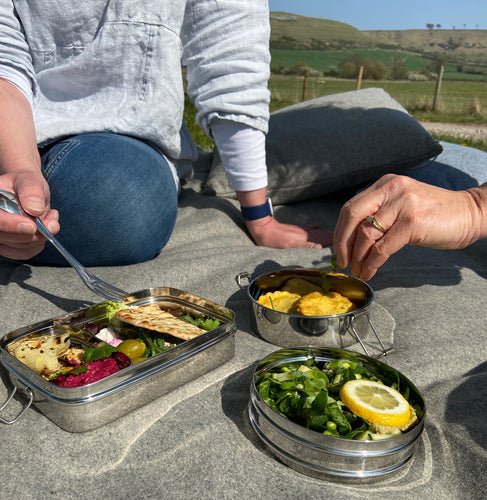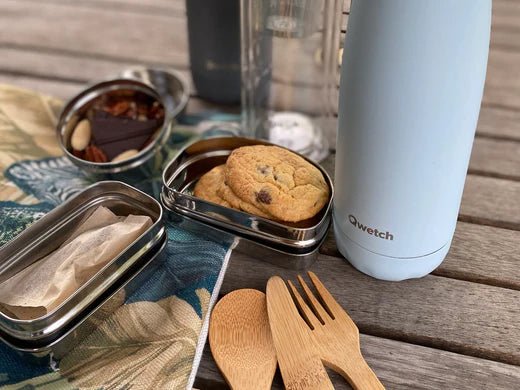How to save energy and money in the kitchen- three eco tips
Over a year on from the start of the cost of living crisis and the biggest hike in fuel prices seen in most of our lifetimes, prices are still high. More than double those in 2018, just 5 years ago. This is affecting everyday activities such as heating our homes, using appliances and cooking. This has resulted in a kind of ‘eco-anxiety’ for many people, where we know what we are doing might be bad for the environment, we are worried about it, but we don’t know what to do to genuinely help! Or if we can afford it!
From our Green Guide to Saving Money + The Planet this week we're concentrating on making savings in the kitchen.

Housing appliances such as ovens, dishwashers and fridge freezers, the kitchen is almost certainly the most energy hungry room in your home. Energy prices rose by up to 50% in April last year, and although tehy are stabilised now, it's worth making a few simple changes to help reduce your energy usage. There are several other helpful eco kitchen tips for saving money too.
Kitchen
Use your dishwasher – but make sure it’s fully loaded
When it comes to dishes, it’s actually usually cheaper – and more environmentally friendly – to use a dishwasher rather than do the washing up in the sink. Dishwashers use less water and energy than filling the sink multiple times a day.
However, dishwashers are still one of the top two home appliances that use the most energy in the home (second to a washing machine) so there are further things you can do to improve a dishwasher’s energy efficiency. Use the eco setting or the lowest temperature, only use it once the load is full and position the dishes according to the dishwasher manual.
If your dishwasher filter, drainage and working parts are covered in grease or food scraps, the machine will not operate efficiently. Keeping the dishwasher clean and free from grease will make sure it is not only working efficiently but also means that it will last longer and clean better too!
Regularly take out the filters and wash in warm water with washing up liquid or a few squirts of Fat Buoy to remove grease and bits. Wipe clean around the door and seals to remove greasy build up, again with warm soapy water or Fat Buoy.
The whole machine, particularly the spray arms may benefit from descaling if you live in a hard water area. A wash cycle with Squeaky Clean once every couple of months will clean and descale all the working parts, leaving your machine squeaky clean!
A homemade alternative is to run a cycle with a cup of distilled vinegar in the top tray and then run another cycle with a cup of baking soda sprinkled on the bottom of the dishwasher. Always run two separate cycles- never together! You will end up with a foaming mess to clean up!
You can find spare parts for most dishwashers, so look online if part of your machine is broken or not working properly. Most are really simple to replace and Ransom Spares has 'How To' videos for replacements and guides for common problems.
Fridge at 4
It turns out 75% of us are running our fridges too warm – costing us both in wasted electricity and spoilt gone off food. Instead, think ‘Fridge at 4’.
4 degrees is the most efficient temperature for your fridge to keep food fresh for longest, as at this temperature bacterial growth can slows down to safe levels. But not so cold that it is wasting electricity to keep unnecessarily cold! It is the Goldilocks of temperatures!
Alongside this, there’s other things you can do to make your fridge more energy efficient. Your fridge has to work harder to keep cool when it's full, so keep space in your fridge for airflow - around 3/4 full is optimal to allow cold air to circulate.
Storing ready to eat products, dairy, and leftovers on the top shelf, meat and fish on the lowest shelf, and veggies and fruits in bottom drawers will keep them freshest for longest.
Make the most of your oven when it’s on
When you have the oven turned on, fill every shelf.
Sweet potato and carrot peelings can be crisped up when you have the oven on for cooking dinner! They make a tasty snack with a bit of oil and salt in place of packets of crisps. Or if you have chickens feed them plain cooked peelings, they will love them.
If you only have one thing to heat up, use your microwave instead – it uses significantly less electricity than heating your oven.
When using your oven, set the timer for 5 minutes before the cooking time and turn the oven off. It takes a long time for ovens to cool so it will carry on cooking.
After cooking, fill your dirty baking trays or cooking dishes with soapy water and return to the oven – they will clean themselves and steam clean the inside of your oven – with no elbow grease! My favourite oven cleaning trick!

For these and more tips on how to save money and be more eco friendly, have look at our Green Guide to Saving Money + The Planet - you can download a handy checklist to keep as a reminder and to add up your savings.





